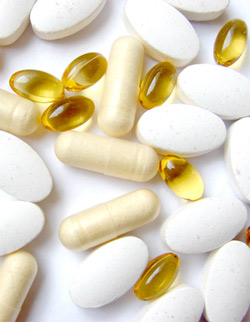|
|
Risk of taking Calcium Supplements
 Calcium
is an important component of a healthy diet and a mineral necessary for life.
The National Osteoporosis Foundation says, "Calcium plays an important role in
building stronger, denser bones early in life and keeping bones strong and
healthy later in life." Approximately 99 percent of the body's calcium is stored
in the bones and teeth. The rest of the calcium in the body has other important
uses, such as some exocytosis, especially neurotransmitter release, and muscle
contraction. Calcium
is an important component of a healthy diet and a mineral necessary for life.
The National Osteoporosis Foundation says, "Calcium plays an important role in
building stronger, denser bones early in life and keeping bones strong and
healthy later in life." Approximately 99 percent of the body's calcium is stored
in the bones and teeth. The rest of the calcium in the body has other important
uses, such as some exocytosis, especially neurotransmitter release, and muscle
contraction.
In the electrical conduction system of the heart, calcium replaces sodium as the
mineral that depolarizes the cell, proliferating the action potential. In
cardiac muscle, sodium influx commences an action potential, but during
potassium efflux, the cardiac myocyte experiences calcium influx, prolonging the
action potential and creating a plateau phase of dynamic equilibrium.
Long-term calcium deficiency can lead to rickets and poor blood clotting and in
case of a menopausal woman, it can lead to osteoporosis, in which the bone
deteriorates and there is an increased risk of fractures. While a lifelong
deficit can affect bone and tooth formation, over-retention can cause
hypercalcemia (elevated levels of calcium in the blood), impaired kidney
function and decreased absorption of other minerals.
Several sources suggest a correlation between high calcium intake (2000 mg per
day, or twice the U.S. recommended daily allowance, equivalent to six or more
glasses of milk per day) and prostate cancer. High calcium intakes or high
calcium absorption were previously thought to contribute to the development of
kidney stones. However, a high calcium intake has been associated with a lower
risk for kidney stones in more recent research. Vitamin D is needed to absorb
calcium.
Dairy products, such as milk and cheese, are a well-known source of calcium.
Some individuals are allergic to dairy products and even more people, in
particular those of non Indo-European descent, are lactose-intolerant, leaving
them unable to consume non-fermented dairy products in quantities larger than
about half a liter per serving. Others, such as vegans, avoid dairy products for
ethical and health reasons.
Many good vegetable sources of calcium exist, including seaweeds such as kelp,
wakame and hijiki; nuts and seeds like almonds, hazelnuts, sesame, and
pistachio; blackstrap molasses; beans (especially soy beans); figs; quinoa;
okra; rutabaga; broccoli; dandelion leaves; and kale. In addition, several foods
and drinks, such as orange juice, soy milk, tofu, breakfast cereals, and breads
are often fortified with calcium.
Numerous vegetables, notably spinach, chard and rhubarb have a high calcium
content, but they may also contain varying amounts of oxalic acid that binds
calcium and reduces its absorption. The same problem may to a degree affect the
absorption of calcium from amaranth, collard greens, and chicory greens. This
process may also be related to the generation of calcium oxalate.
An overlooked source of calcium is eggshell, which can be ground into a powder
and mixed into food or a glass of water.
Calcium supplements
 Calcium supplements are used to prevent and to treat calcium deficiencies.
Office of Dietary Supplements (National Institutes of Health) recommends that no
more than 600 mg of supplement should be taken at a time because the percent of
calcium absorbed decreases as the amount of calcium in the supplement increases.
It is therefore recommended to spread doses throughout the day. Recommended
daily calcium intake for adults ranges from 1000 to 1300 mg. Calcium supplements
may have side effects such as bloating and constipation in some people. It is
suggested that taking the supplements with food may aid in nullifying these side
effects. Calcium supplements are used to prevent and to treat calcium deficiencies.
Office of Dietary Supplements (National Institutes of Health) recommends that no
more than 600 mg of supplement should be taken at a time because the percent of
calcium absorbed decreases as the amount of calcium in the supplement increases.
It is therefore recommended to spread doses throughout the day. Recommended
daily calcium intake for adults ranges from 1000 to 1300 mg. Calcium supplements
may have side effects such as bloating and constipation in some people. It is
suggested that taking the supplements with food may aid in nullifying these side
effects.
Vitamin D is added to some calcium supplements. Proper vitamin D status is
important because vitamin D is converted to a hormone in the body, which then
induces the synthesis of intestinal proteins responsible for calcium absorption.
The absorption of calcium from most food and commonly used dietary supplements
is very similar. This is contrary to what many calcium supplement manufacturers
claim in their promotional materials. Milk is an excellent source of dietary
calcium for those whose bodies tolerate it because it has a high concentration
of calcium and the calcium in milk is excellently absorbed.
Soymilk and other vegetable milks are usually sold with calcium added so that
their calcium concentration is as high as in milk. Also different kind of juices
boosted with calcium are widely available.
Calcium carbonate is the most common and least expensive calcium supplement. It
should be taken with food, and depends on low pH levels (acidic) for proper
absorption in the intestine. Some studies suggests that the absorption of
calcium from calcium carbonate is similar to the absorption of calcium from
milk. While most people digest calcium
carbonate very well, some might develop gastrointestinal discomfort or gas.
Taking magnesium with it can help to avoid constipation. Calcium carbonate is
40% elemental calcium.
1000 mg will provide 400 mg of calcium. However, supplement labels will usually
indicate how much calcium is present in each serving, not how much calcium
carbonate is present. Antacids frequently contain calcium carbonate, and are a
commonly used, inexpensive calcium supplement.
Coral calcium is a salt of calcium derived from fossilized coral reefs. Coral
calcium is composed of calcium carbonate and trace minerals. Calcium citrate can
be taken without food and is the supplement of choice for individuals with
achlorhydria or who are taking histamine-2 blockers or proton-pump inhibitors.
Calcium citrate is about 21% elemental calcium. 1000 mg will provide 210 mg of
calcium. It is more expensive than calcium carbonate and more of it must be
taken to get the same amount of calcium.
Calcium phosphate costs more than calcium carbonate, but less than calcium
citrate. Microcrystalline Hydroxyapatite (MH) is one of several forms of calcium
phosphate used as a dietary supplement. Hydroxyapatite is about 40% calcium.
Calcium lactate has similar absorption as calcium carbonate, but is more
expensive. Calcium lactate and calcium gluconate are less concentrated forms of
calcium and are not practical oral supplements.
Calcium chelates are synthetic calcium compounds in which calcium is bound to an
organic molecule, such as malate, aspartate, or fumarate. These forms of calcium
may be better absorbed on an empty stomach. However, in general they are
absorbed similarly to calcium carbonate and other common calcium supplements
when taken with food. The
"chelate" mimics the action that natural food performs by keeping the calcium
soluble in the intestine. Thus, on an empty stomach, in some individuals,
chelates might, in theory, be absorbed better.
According to the Institute of Medicine, the recommended daily amount of calcium
to get is:
1-3 years: 700 milligrams daily
4-8 years: 1,000 milligrams daily
9-18 years: 1,300 milligrams daily
19-50 years: 1,000 milligrams daily
51-70 years: 1,200 milligrams daily for women; 1,000 milligrams daily for men
71 and older: 1,200 milligrams daily
The Institute of Medicine says that most in the U.S. get enough calcium, except
for girls 9 to 18 years old. Although women�s recommended calcium needs to
increase with menopause, postmenopausal woman taking supplements may also be at
greater risk of getting too much calcium.
Cardiovascular impact of calcium supplements intake
A study investigating the effects of personal calcium supplement use on
cardiovascular risk in the Women�s Health Initiative Calcium/Vitamin D
Supplementation Study (WHI CaD Study) found a modestly increased risk of
cardiovascular events, particularly myocardial infarction in postmenopausal
women. A broad recommendation of calcium/vitamin D supplements is therefore not
warranted. In contrast, the authors of a 2013 literature review concluded that
the benefits of calcium supplementation, such as on bone health, appear to
outweigh any risk calcium supplementation may theoretically pose to the
cardiovascular health.
 Hazards and toxicity of calcium supplements intake Hazards and toxicity of calcium supplements intake
Compared with other metals, the calcium ion and most calcium compounds have low
toxicity. This is not surprising given the very high natural abundance of
calcium compounds in the environment and in organisms. Calcium poses few serious
environmental problems, with kidney stones the most common side-effect in
clinical studies. Acute calcium poisoning is rare, and difficult to achieve
unless calcium compounds are administered intravenously. For example, the oral
median lethal dose (LD50) for rats for calcium carbonate and calcium chloride
are 6.45 and 1.4 g/kg respectively.
Calcium metal is hazardous because of its sometimes-violent reactions with water
and acids. Calcium metal is found in some drain cleaners, where it functions to
generate heat and calcium hydroxide that signifies the fats and liquefies the
proteins (e.g., hair) that block drains. When swallowed calcium metal has the
same effect on the mouth, esophagus and stomach, and can be fatal.
Excessive consumption of calcium carbonate antacids/dietary supplements (such as
Tums) over a period of weeks or months can cause milk-alkali syndrome, with
symptoms ranging from hypercalcemia to potentially fatal renal failure. What
constitutes �excessive� consumption is not well known and, it is presumed,
varies a great deal from person to person. Persons consuming more than 10
grams/day of CaCO3 (=4 g Ca) are at risk of developing milk-alkali syndrome but
the condition has been reported in at least one person consuming only 2.5
grams/day of CaCO3 (=1 g Ca), an amount usually considered moderate and safe.
Oral calcium supplements diminish the absorption of thyroxine when taken within
four to six hours of each other. Thus, people taking both calcium and thyroxine
run the risk of inadequate thyroid hormone replacement and thence hypothyroidism
if they take them simultaneously or near-simultaneously.
Health Risks from Excessive Calcium
Excessively high levels of calcium in the blood known as hypercalcemia can cause
renal insufficiency, vascular and soft tissue calcification, hypercalciuria
(high levels of calcium in the urine) and kidney stones. Although very high
calcium intakes have the potential to cause hypercalcemia, it is most commonly
associated with primary hyperparathyroidism or malignancy.
High calcium intake can cause constipation. It might also interfere with the
absorption of iron and zinc, though this effect is not well established. High
intake of calcium from supplements, but not foods, has been associated with
increased risk of kidney stones. Some evidence links higher calcium intake with
increased risk of prostate cancer, but this effect is not well understood, in
part because it is challenging to separate the potential effect of dairy
products from that of calcium. Some studies also link high calcium intake,
particularly from supplements, with increased risk of cardiovascular disease.
The Tolerable Upper Intake Levels (ULs) for calcium established by the Food and
Nutrition Board are listed in Table 3 in milligrams (mg) per day. Getting too
much calcium from foods is rare; excess intakes are more likely to be caused by
the use of calcium supplements. NHANES data from 2003�2006 indicate that
approximately 5% of women older than 50 years have estimated total calcium
intakes (from foods and supplements) that exceed the UL by about 300�365 mg
Calcium supplements intake interactions with medications
Calcium supplements have the potential to interact with several types of
medications. Calcium can decrease absorption of the following drugs when taken
together: biphosphonates (to treat osteoporosis), the fluoroquinolone and
tetracycline classes of antibiotics, levothyroxine, phenytoin (an
anticonvulsant), and tiludronate disodium (to treat Paget's disease). Thiazide-type
diuretics can interact with calcium carbonate and vitamin D supplements,
increasing the risks of hypercalcemia and hypercalciuria . Both aluminum- and
magnesium-containing antacids increase urinary calcium excretion. Mineral oil
and stimulant laxatives decrease calcium absorption. Glucocorticoids, such as
prednisone, can cause calcium depletion and eventually osteoporosis when they
are used for months.
In the Women's Health Initiative, a clinical trial involving 36,282
postmenopausal women, daily supplementation with 1,000 mg of calcium and 400
International Units (IU) of vitamin D3 for 7 years produced no significant
differences in the risk of invasive colorectal cancer compared to placebo.
The authors of a Cochrane systematic review concluded that calcium
supplementation might moderately help prevent colorectal adenomas, but there is
not enough evidence to recommend routine use of calcium supplements to prevent
colorectal cancer. Given the long latency period for colon cancer development,
long-term studies are needed to fully understand whether calcium intakes affect
colorectal cancer risk.
Dated 22 May 2014
|
|
|
|
|









